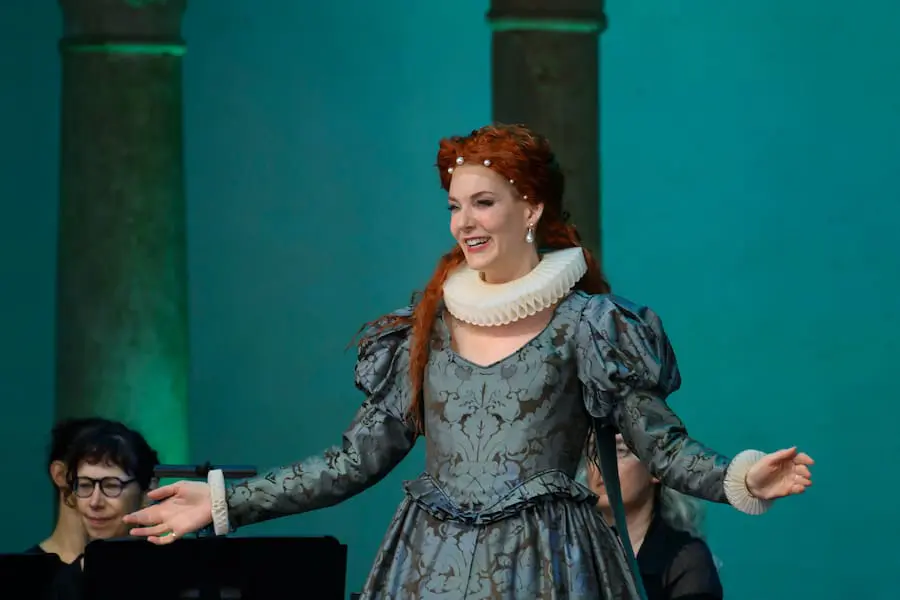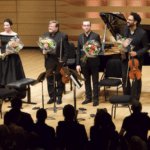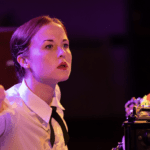Few operas can have enjoyed a splashier premiere than Francesca Caccini’s Alcina. In the Florence of February 1625, the Medici court gathered at the grand villa of Maria Magdalena, widow of Grand Duke Cosimo II, to welcome the visiting Prince Wladyslaw of Poland, to whom she hoped to marry off one of her daughters. (For the record, it didn’t happen.) In the prince’s honour, the grand duchess had arranged an elaborate entertainment: Caccini’s fanciful opera culminated in a lavish pair of dance divertissement—one ballet performed on foot, the other on horseback, with the nobility proudly parading their equestrian prowess. With Cosimo’s son and successor, Ferdinando II, still in his minority at only fourteen, Tuscany was being ruled by his two regents, his mother and his grandmother, Christina of Lorraine. And with two powerful grand duchesses holding sway there, it’s no surprise that Florence was giving birth to the very first opera written by a woman: La liberazione di Ruggiero dall’isola d’Alcina—The Liberation of Ruggiero from the Island of Alcina—to give Caccini’s work its resonant full name.
Caccini had opera in her blood. Her father, Giulio Caccini, a member of the groundbreaking Florentine Camerata, was one of the founding fathers of the genre; and in 1600 thirteen-year-old Francesca had sung in the first performance of Jacopo Peri’s Euridice, the earliest opera to survive today. By 1625, when Alcina took shape, she was highly regarded as both singer and composer, and she tailored the challenging title role to her own vocal talents. Her opera’s basic sound world will be familiar to anyone who knows Monteverdi’s three extant operatic masterworks, especially the earliest, Orfeo (1607): but in addition to the shapely recitatives and the pleasing airs, Caccini provides some particularly winning emsembles for a trio of women and a rip-roaring farewell to her enchanted isle for the defeated sorceress and her angry chorus of monsters—as so often happens in opera, the baddies get very good music to sing. And in Alcina—the captivating creature introduced in 1516 in Ariosto’s Orlando furioso, that fertile breeding ground for so many a baroque opera—Caccini fashioned for herself perhaps the most fully wrought female role yet seen in the still-youthful genre, a compelling mixture of sweet seductiveness, deep emotional vulnerability, and blinding rage. It could well have been written for Mireille Lebel, the Alcina of Boston Early Music Festival’s first-rate performance at Caramoor on the sunny late afternoon of June 25, so well did it suit her silky mezzo-soprano, with its admirable range of colors and dynamics; and her handsome, eloquent stage persona—equally convincing as glamorous enchantress and haggish witch—maintained a neat balance between period stylization and more naturalistic gestures. As the object of her obsessive affection, the Saracen knight Ruggiero (not yet a Christian convert), tenor Colin Balzer matched her in supple tone and stylistic mastery; and as the shape-shifting “good” sorceress, Melissa, Cecilia Duarte’s darker mezzo contrasted effectively with Lebel’s. As the prologue’s Neptune, bass-baritone Douglas Williams welcomed the Polish river Vistula (tenor Kyle Stegall) to the Florentine court with the requisite authority; and another BEMF stalwart, soprano Teresa Wakim, as a siren, lulled Ruggiero to slumber with beguiling grace. The opera was simply staged by Gilbert Blin, with no set but fine period costumes by Anna Watkins. Melinda Sullivan’s simple choreography was gracefully executed by the singers, who in the final ballo danced to music by Emilio de’ Cavalieri, Caccini’s score for the divertissement being lost. (Needless to say, there were no horses, though they would have made a fine sight on Caramoor’s lush and lovely grounds.) The twelve instumentalists, stationed onstage behind the action, were led from their ranks with predictable expertise by BEMF’s joint Music Directors, Paul O’Dette and Stephen Stubbs, and concertmaster Robert Mealy. Caramoor’s covered outdoor Venetian Theater may not have been the ideal venue for this Florentine entertainment, but the happy cheering at its end offered a fair signal that few in the audience felt even slightly shortchanged.
Related Content ⬇
Opera Canada depends on the generous contributions of its supporters to bring readers outstanding, in-depth coverage of opera in Canada and beyond. Please consider subscribing or donating today.
BOSTON EARLY MUSIC FESTIVAL
JUNE 10-25, 2023
CACCINI ALCINA
Paul O’Dette & Stephen Stubbs Musical Directors
Gilbert Blin Stage Director
Robert Mealy Concertmaster
Melinda Sullivan Dance Director
Anna Watkins Costume Designer
Kelly Martin Lighting Designer
Kathleen Fay Executive Producer
Boston Early Music Festival Vocal Ensemble
Mireille Lebel Alcina
Colin Balzer Ruggiero
Cecilia Duarte Melissa
Mindy Ella Chu, Hannah De Priest, David Evans, Daniel Fridley, Michael Galvin, Brian Giebler, Kameryn Lueng, Nola Richardson, Megan Stapleton, Kyle Stegall, Douglas Williams, & Teresa Wakim















